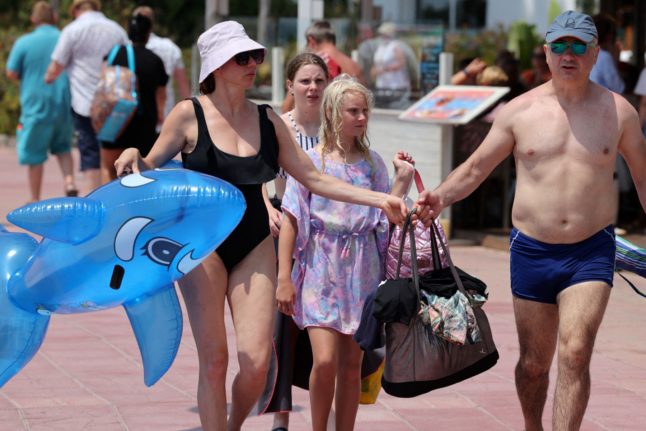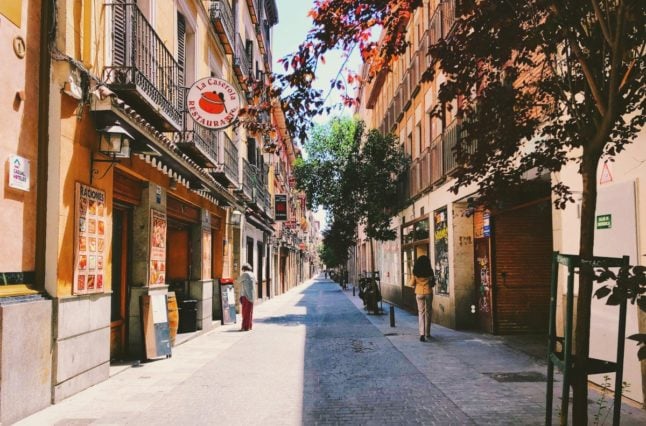American playwright Eugene O’Neill once said: “There is no present or future – only the past, happening over and over again – now”.
In 2022, The Local Spain wrote a fact-checking article titled ‘Are UK tourists in Spain really being asked to prove €100 a day?‘, in which we dispelled the claims made in the British press about Spain’s alleged new rules for UK holidaymakers.
Two years on in 2024, the same eye-catching headlines are resurfacing in Blighty: “’Anti-British? Holiday elsewhere!’ Britons fume as tourists in Spain warned they may be subject to additional rules” in GB News, or “’They would be begging us to come back’: Brits vow to ‘boycott Spain’ over new £97 daily rule” in LBC.
The return of this rabble-rousing ‘news’ in the UK has coincided with calls within Spain to change the existing mass tourism model that’s now more than ever having an impact on the country’s housing crisis.
Even though Spaniards behind the protests have not singled out any foreign nationals as potential culprits, the UK tabloids have unsurprisingly capitalised on this and run headlines such as “Costa del Sol turns on British tourists”.
READ MORE: Why does hatred of tourists in Spain appear to be on the rise?
What is the so-called ‘£97 daily rule’?
Yes, there is theoretically a ‘£97 a day rule’, but it is not a new rule, nor one that applies only to UK nationals specifically, and not even one that Spain alone has imposed (all Schengen countries set their financial means threshold).
As non-EU nationals who are not from a Schengen Area country either (the United Kingdom never was in Schengen), British tourists entering Spain could have certain requirements with which to comply if asked by Spanish border officials.
Such requirements include a valid passport, proof of a return ticket, documents proving their purpose of entry into Spain, limits on the amount of time they can spend in Spain (the 90 out of 180 days Schengen rule), proof of accommodation, a letter of invitation if staying with friends or family (another controversial subject in the British press when it emerged) and yes, proof of sufficient financial means for the trip.
Third-country nationals who want to enter Spain in 2024 may need to prove they have at least €113,40 per day (around £97), with a minimum of €972 (around £830) per person regardless of the intended duration of the stay. It is unclear whether this could also possibly apply to minors.
The amount of financial means to prove has increased slightly in 2024 as it is linked to Spain’s minimum wage, which has also risen.
Financial means can be accredited by presenting cash, traveller’s checks, credit cards accompanied by a bank account statement, an up-to-date bank book or any other means that proves the amount available as credit on a card or bank account.
Have Britons been prevented from entering Spain for not having enough money?
There is no evidence that UK holidaymakers have been prevented from entering Spain after not being able to show they have £97 a day to cover their stay, nor any reports that they have been asked to show the financial means to cover their stay either.
17.3 million UK tourists visited Spain in 2023; equal to roughly 47,400 a day.
Even though British tourists have to stand in the non-EU queue at Spanish passport control, they do not require a visa to enter Spain and the sheer number of UK holidaymakers means that they’re usually streamlined through the process, having to only quickly show their passports.
The only occasional hiccups that have arisen post-Brexit have been at the land border between Gibraltar and Spain (issued that are likely to be resolved soon), and these weren’t related to demonstrating financial means.
Therefore, the British press are regurgitating alarmist headlines that don’t reflect any truth, but rather pander to the ‘they need us more than we need them’ mantra that gets readers clicking.
To sum up, there is a £97 a day rule, but it is not new, it has not affected any British tourists to date, and it is not specific to Spain alone to potentially require proof of economic means.



 Please whitelist us to continue reading.
Please whitelist us to continue reading.
Member comments